《英汉翻译理论与实践》课程练习及答案
英语翻译理论与实践

Luminous moonlight shines upon the bedstand,
Isn’t it the white frost paving on the bare ground?
Head, raised to gaze the moon into distance,
死译:one-to-one translation: each SL word has a corresponding TL word.
硬译:word-for-word translation: Transfers SL grammar and word order, as well as the primary meanings of all the SL words, into translation. It is normally effective only for brief simple neutral sentences.
The bright moon light sprinkles on the bed,
As if the frost lays on the ground.
Raise myhead and stare at the moon,
The homesickness attacks me suddenly.
Lowering head to think of the hometown.
In the Still of the Night(直译)
I descry bright moonlight in front ofmy bed.
I suspect it to be hoary frost on the floor.
原文:John can be relied on. He eats no fish and plays the game.
叶子南《高级英汉翻译理论与实践》(第3版)配套题库(含考研真题)(翻译的基本技巧 1.5 分合移位法
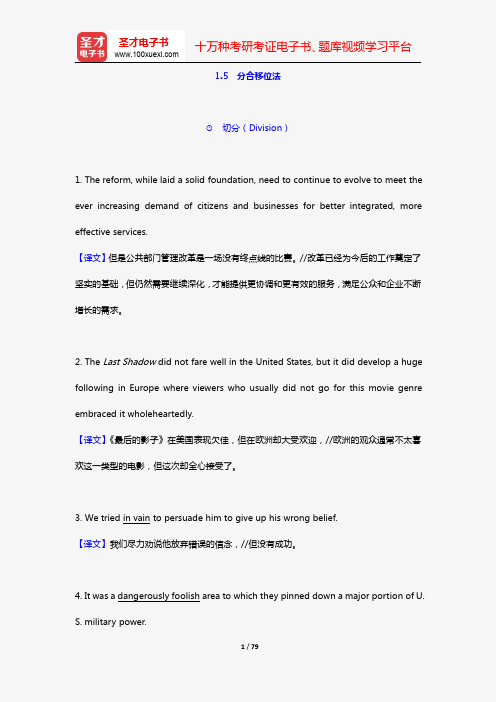
1.5分合移位法⊙切分(Division)1.The reform,while laid a solid foundation,need to continue to evolve to meet the ever increasing demand of citizens and businesses for better integrated,more effective services.【译文】但是公共部门管理改革是一场没有终点线的比赛。
//改革已经为今后的工作奠定了坚实的基础,但仍然需要继续深化,才能提供更协调和更有效的服务,满足公众和企业不断增长的需求。
2.The Last Shadow did not fare well in the United States,but it did develop a huge following in Europe where viewers who usually did not go for this movie genre embraced it wholeheartedly.【译文】《最后的影子》在美国表现欠佳,但在欧洲却大受欢迎,//欧洲的观众通常不太喜欢这一类型的电影,但这次却全心接受了。
3.We tried in vain to persuade him to give up his wrong belief.【译文】我们尽力劝说他放弃错误的信念,//但没有成功。
4.It was a dangerously foolish area to which they pinned down a major portion of U. itary power.【译文】他们把美国一大部分军事力量困在那个地区,//这(样做)是愚蠢而危险的。
5.Hitler’s black empire would suddenly collapse in rubble,blood,and flame. (Winds of War)【译文】希特勒的黑暗帝国顷刻之间就会在血泊与烈火中崩溃,//夷为废墟。
《高级英汉翻译理论与实践》翻译实践及详解(Mayhew)【圣才出品】
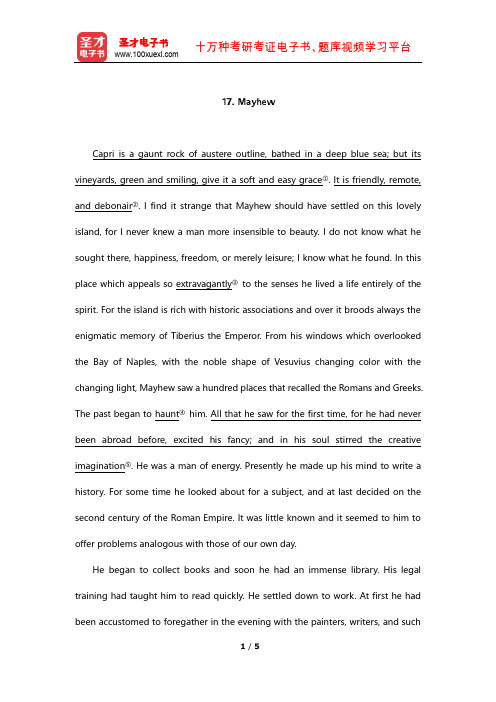
17. MayhewCapri is a gaunt rock of austere outline, bathed in a deep blue sea; but its vineyards, green and smiling, give it a soft and easy grace①. It is friendly, remote, and debonair②. I find it strange that Mayhew should have settled on this lovely island, for I never knew a man more insensible to beauty. I do not know what he sought there, happiness, freedom, or merely leisure; I know what he found. In this place which appeals so extravagantly③to the senses he lived a life entirely of the spirit. For the island is rich with historic associations and over it broods always the enigmatic memory of Tiberius the Emperor. From his windows which overlooked the Bay of Naples, with the noble shape of Vesuvius changing color with the changing light, Mayhew saw a hundred places that recalled the Romans and Greeks. The past began to haunt④him. All that he saw for the first time, for he had never been abroad before, excited his fancy; and in his soul stirred the creative imagination⑤. He was a man of energy. Presently he made up his mind to write a history. For some time he looked about for a subject, and at last decided on the second century of the Roman Empire. It was little known and it seemed to him to offer problems analogous with those of our own day.He began to collect books and soon he had an immense library. His legal training had taught him to read quickly. He settled down to work. At first he had been accustomed to foregather in the evening with the painters, writers, and suchlike who met in the little tavern near the Piazza, but presently he withdrew himself, for his absorption in his studies became more pressing. He had been accustomed to bathe in that bland sea and to take long walks among the pleasant vineyards, but little by little, grudging the time, he ceased to do so⑥. He worked harder than he had ever worked in Detroit. He would start at noon and work all through the night till the whistle of the steamer that goes every morning from Capri to Naples told him that it was five o’clock and time to go to bed. His subject opened out before him, vaster and more significant⑦, and he imagined a work that would put him forever beside the great historians of the past. As the years went by he was to be found seldom in the ways of men. He could be tempted to come out of his house only by a game of chess or the chance of an argument. He loved to set his brain against another’s⑧. He was widely read now, not only on history, but in philosophy and science; and he was a skillful controversialist, quick, logical, and incisive⑨. But he had good-humor⑩and kindliness; though he took a very human pleasure in victory⑪, he did not exult in it to your mortification.By William S. Maugham 【参考译文】卡普里岛在深蓝色的大海中,远远望去仿佛是一块朴实无华的荒凉的岩石。
叶子南《高级英汉翻译理论与实践》(第3版)配套题库(含考研真题)(翻译的基本技巧 1.6 定语从句)

1.6定语从句Ⅰ.译为定语1.There will come a day when people the world over will live a happy life under the sun of socialism.【译文】全世界人民在社会主义阳光下过幸福生活的一天是会到来的。
2.Those who did not die from smallpox usually carried scars on their faces for life.【译文】那些没有死于天花的人通常脸上会终生留下疤痕。
3.This is the very hotel where they spent their honeymoon.【译文】这正是他们曾经度蜜月的那家旅馆。
4.The technique of organ transplant,as a significant surgical breakthrough to heal the wounded and rescue the dying,has saved a good many patients who are on the point of death.【译文】器官移植手术是外科方面的重大技术突破,目的是救死扶伤,已经挽救了许多濒临死亡的病人的生命。
5.Mr.Murdoch who owns the New York Post indicated that U.S.newspaper’s editorial strategies were to blame for their financial problems.【译文】拥有《纽约邮报》的默多克先生指出,美国报纸的编辑战略应承担报纸财务问题的责任。
【解析】这里的定语从句的翻译是典型的前置法。
翻译时按照汉语的习惯加个“的”字。
6.The people who worked for him lived in mortal fear of him.【译文】在他手下工作的人对他怕得要死。
《高级英汉翻译理论与实践》翻译实践及详解(Has Democracy a Future)【圣才出品】
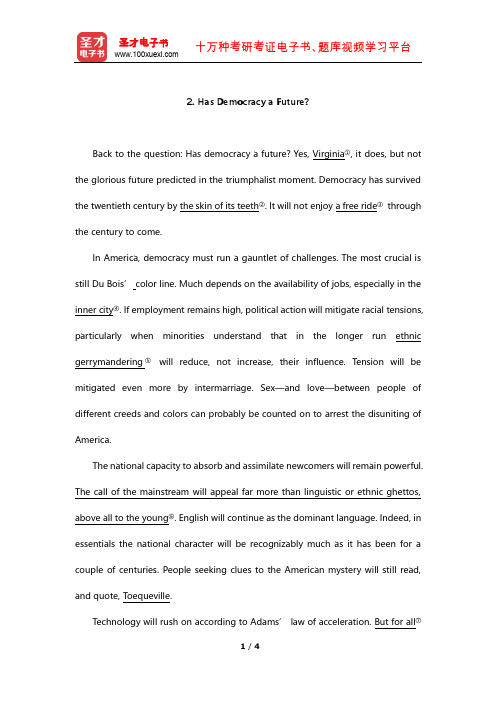
2. Has Democracy a Future?Back to the question: Has democracy a future? Yes, Virginia①, it does, but not the glorious future predicted in the triumphalist moment. Democracy has survived the twentieth century by the skin of its teeth②. It will not enjoy a free ride③through the century to come.In America, democracy must run a gauntlet of challenges. The most crucial is still Du Bois’ color line. Much depends on the availability of jobs, especially in the inner city④. If employment remains high, political action will mitigate racial tensions, particularly when minorities understand that in the longer run ethnic gerrymandering⑤will reduce, not increase, their influence. Tension will be mitigated even more by intermarriage. Sex—and love—between people of different creeds and colors can probably be counted on to arrest the disuniting of America.The national capacity to absorb and assimilate newcomers will remain powerful. The call of the mainstream will appeal far more than linguistic or ethnic ghettos, above all to the young⑥. English will continue as the dominant language. Indeed, in essentials the national character will be recognizably much as it has been for a couple of centuries. People seeking clues to the American mystery will still read, and quote, Toequeville.Technology will rush on according to Adams’ law of acceleration. But for all⑦the temptations of interactivity⑧and all the unpopularity of elected officials, I doubt that Americans will sanction the degradation⑨of representative democracy into a system of plebiscites. Capitalism too will careen on, through downs as well as ups, but laissez-faire ideology will probably wane as capitalists discover the range of troubles the unfettered market cannot solve, or makes worse. Unbridled capitalism, with low wages, long hours, and exploited workers, excites social resentment, revives class warfare, and infuses Marxism with new life. To move along constructive lines, capitalism must subordinate short-term plans and profits to such long-term social necessities⑩as investment in education, research and development, environmental protection, the extension of health care, the rehabilitation of infrastructure, the redemption of the city. Capitalists are not likely to do this by themselves. Long- term perspectives demand public leadership⑪ and affirmative government.From Foreign Affairs, September/October 1997 【参考译文】回到我们原来的问题:民主有前途吗?有!①民主是有前途,但并不像人们在必胜信念、乐观心态盛行时期所预测的那种光辉灿烂的前途。
翻译理论与实践知到章节答案智慧树2023年湖南中医药大学
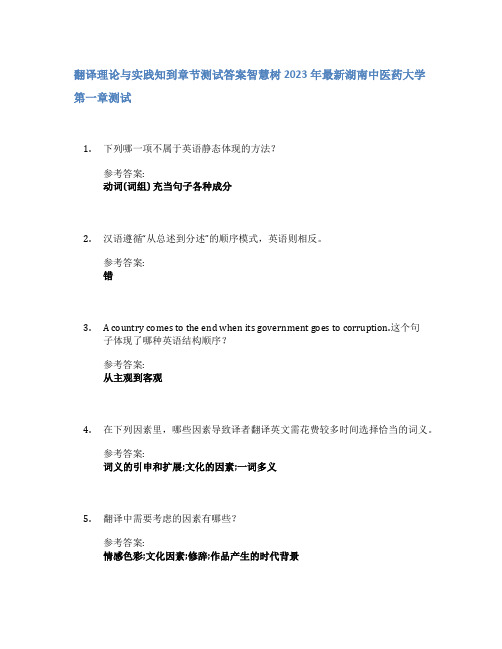
翻译理论与实践知到章节测试答案智慧树2023年最新湖南中医药大学第一章测试1.下列哪一项不属于英语静态体现的方法?参考答案:动词(词组) 充当句子各种成分2.汉语遵循“从总述到分述”的顺序模式,英语则相反。
参考答案:错3. A country comes to the end when its government goes to corruption.这个句子体现了哪种英语结构顺序?参考答案:从主观到客观4.在下列因素里,哪些因素导致译者翻译英文需花费较多时间选择恰当的词义。
参考答案:词义的引申和扩展;文化的因素;一词多义5.翻译中需要考虑的因素有哪些?参考答案:情感色彩;文化因素;修辞;作品产生的时代背景6.下列哪些模式适用于英语表达参考答案:焦点前置模式;上下主从层级模式;空间顺序模式7.下列哪一选项最符合翻译过程中迁就目标语表达模式?参考答案:null8.以下哪些句子体现了增词翻译原则中的修辞性增词:参考答案:At thirty-five, she had first learned what it is to be a mother. “她到35岁的时候才生平第一次尝到做母亲的滋味。
”;There has been too muchpublicity about the case. “那件案子已经搞得满城风雨,人尽皆知了。
”9.英语表达中,动词地位不平等是客观存在的事实,主要体现在参考答案:过去分词结构;不定式结构;现在分词结构;无动词结构10.汉语结构中主语缺失是一种十分普遍的现象,而英语中是不允许存在的。
参考答案:错第二章测试1.I hope to be able to come.这个句子体现的是不定式结构的哪种上下主从模式参考答案:主干动词+不定式的主从关系2.下列哪一项与其它选项过去分词结构体现的上下主从结构模式不一样参考答案:The river witnessed the growth of Chinese people.3.包含原则,是指一个相对较大的时间范围内包含某个精确时间点,在这个精确的时间点发生了某个事件,则以精确事件为焦点,作为主句,置于句首,而关于时间范围的事件,沦为背景信息,作为从句或从属成分,在句中居于偏后的位置。
叶子南《高级英汉翻译理论与实践》(第3版)配套题库(含考研真题)(翻译的基本技巧 1.8 被动语态)

1.8被动语态Ⅰ.将下列被动句翻译成汉语,保留原句主语。
1.His pride must be pinched.【译文】他这股傲气应该打下去。
2.The happy man cannot be handed.【译文】吉人自有天相。
3.This oil is used as perfume.【译文】这种油可以用作香水。
4.On their domestic stations events in the Middle East were dismissed briefly.【译文】在他们国内电台的广播中,中东事件只轻描淡写地报道了一下。
5.A new student is kept on probation for one semester.【译文】新学生规定要见习一个学期。
6.The whole country was armed in a few days.【译文】几天之内全国武装起来了。
7.This sort of advertisement is seen everywhere.【译文】这类广告四处可见。
8.X-ray examination of the chest and heart should be routinely performed.【译文】胸部和心脏X线检查应列为常规。
9.The article had been translated into English,but with little elegance to speak of.【译文】这篇文章译成英语后失去了不少文采。
10.Specifically,clear standards are being setting up for accountability,transparence and participatory governance.【译文】具体而言,明确的标准正在制定之中,为问责制、透明度和参与施政订立明确的标准。
叶子南《高级英汉翻译理论与实践》(第3版)配套题库(含考研真题)(翻译的基本技巧 1.1 解包袱法)
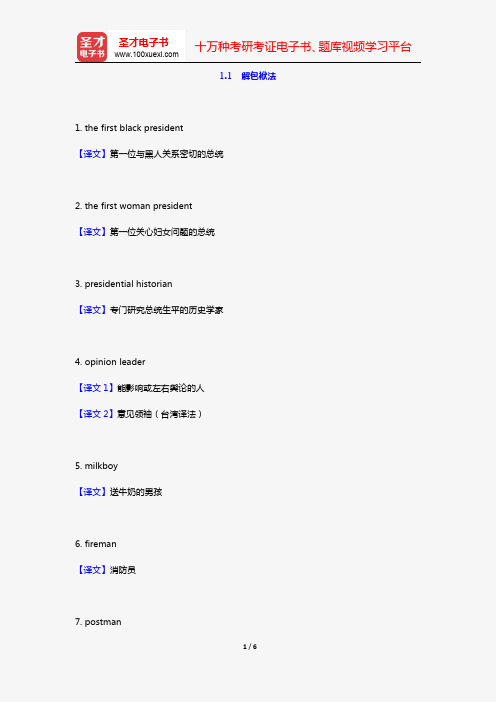
1.1解包袱法1.the first black president【译文】第一位与黑人关系密切的总统2.the first woman president【译文】第一位关心妇女问题的总统3.presidential historian【译文】专门研究总统生平的历史学家4.opinion leader【译文1】能影响或左右舆论的人【译文2】意见领袖(台湾译法)kboy【译文】送牛奶的男孩6.fireman【译文】消防员7.postman【译文】送邮件的人8.sick room【译文】病房9.criminally insane【译文】刑事法庭鉴定为患有精神病10.a morning person【译文】习惯早起的人11.a body shop【译文】车身修理厂(洗车店)12.manage forests sustainably【译文】管理森林,以便使其可以持续发展13.digital gap【译文】数字鸿沟/数位落差(台湾译法)【解析】对于已经形成相对固定的说法的包袱,可不解。
14.peak load【译文】峰值负荷15.satellite communications ground station equipment repairer【译文】卫星通讯地面站设备维修人员16.The divorce is less culturally acceptable in a society that is family-oriented.【译文】在以家庭为中心的社会文化背景下,离婚是难以接受的。
17.I am pleased to be here to offer a U.S.business perspective on one of today’s great quality challenges:building a high skills/high wage workforce.【译文】我很高兴能来此介绍一下美国商界对当今我们在素质方面所面临的挑战的看法,这项挑战就是如何建立一支高技术、高薪金的劳动队伍。
- 1、下载文档前请自行甄别文档内容的完整性,平台不提供额外的编辑、内容补充、找答案等附加服务。
- 2、"仅部分预览"的文档,不可在线预览部分如存在完整性等问题,可反馈申请退款(可完整预览的文档不适用该条件!)。
- 3、如文档侵犯您的权益,请联系客服反馈,我们会尽快为您处理(人工客服工作时间:9:00-18:30)。
一.英汉翻译理论与实践课程之教案目录第1讲“翻译”溯源第2讲翻译的本质第3讲翻译的标准第4讲翻译面面观第5讲翻译必有“失”/ 失于此而得于彼(两讲合并)第6讲翻译与联想第7讲翻译与语法第8讲翻译与语体第9讲翻译与语篇第10讲英汉十大差异第11讲形合与意合第12讲代词的困惑第13讲Connotation的翻译第14讲翻译与词典第15讲以“模糊”求精确第16讲落笔知轻重译文讲分寸第17讲翻译最难是口吻第18讲翻译与形象思维第19讲翻译与灵感思维第20讲英语修辞的翻译(包括连接三讲)第21讲翻译中的文化冲击第22讲思维是语言的脊梁(两讲合并)第23讲翻译美学之思考(两讲合并)二.汉英翻译理论与实践课程之教案目录第1讲汉译英呼唤文字功力第2讲语篇与翻译第3讲:英汉语美感比读(两讲合并)第4讲:理性概译:翻译之坦途第5讲:英语句式的亮点:非人称主语句(两讲合并)第6讲:汉译英有用的句型(两讲合并)第7讲:类析汉译英常见拙译(三讲合并)第8讲:从“湖光山色”的英译说开去(两讲合并)第9讲:Denotation和Connotation(两讲合并)第10讲:翻译,你的本质是什么?第11讲:归化与异化----汉语习语的英译一.英汉翻译理论与实践课程之练习第1讲“翻译”溯源试将下列文字译成汉语:1/ Translation consists in reproducing in the receptor language the closest natural equivalent of the source language, first in terms of meaning and secondly in terms of style. (Eugene A. Nida & Charles R. Taber: The Theory and Practice of Translation, 1969)2/ Translation may be defined as follows:The replacement of textual material in one language (SL) by equivalent textual material in another language (TL)3/ A translation should give a complete transcript of the ideas of the original work. The style and manner of writing should be of the same character as that of the original. A translation should have all the ease of the original composition. (A. F. Tytler: Essay on the Principles of Translation. 1791)参考译文1/ 所谓翻译,是在译语中用最切近的自然的对等语再现原语的信息,首先是意义,其次是文体。
2/ 翻译可作如下界定:用一种语言(目的语)的文本材料对等地再现另一种语言(出发语)的文本材料。
3/ 译文应完全复写出原作的思想。
译文的风格和笔调应与原文的性质相同。
译文应和原作同样流畅。
第2讲翻译的本质将下列段落译成汉语:1/ Some professional translation take considerable pride in denying that they have any theory of translation—--they just translate. In reality, however, all person engaged in the complex task of translating posses some type of underlying or covert theory, even though it may be still very embryonic and described only as just being “faithful to what the author was trying to say.”(Nida )2/ It is rendering the meaning of a text into another language in the way that the author intended the text. Common sense tells us that this ought to be simple, as one ought to be able to say something as well in one language as in another. On the other hand, you may see it as complicated, artificial and fraudulent, since by using another language you are pretending to be someone you are not. The translation cannot simply reproduce, or be, the original. And since this is so, the first business of the translator is to translate. (Peter Newmark)参考译文:1/ 一些职业翻译工作者相当得意地称他们没有翻译理论——他们只顾埋头翻译。
然而,事实上,所有从事翻译这项复杂工作的人都具有或隐或掩的理论,尽管这种理论尚处在萌芽状态,或者被轻描淡写地说成“忠实于作者想要说的”。
(奈达)2/ 翻译,就是像原作者把思想变成文字那样,把一个文本的意思译成另一种语言。
常识告诉我们翻译应该是简单的,就如一个人能够用一种语言自如表达,也能够用另一种语言自如表达一样。
但从另一方面来说,你也许会觉得翻译是复杂的、做作的以及虚假的,因为在使用另一种语言的时候,你实际上在扮演一个非你的角色。
翻译不可能是简单的复制,或者,也不可能是如出一辙的原本。
既然如此,译者的第一任务就是翻译。
(纽马克)第3讲翻译的标准请将下列段落译成汉语:Translation is first a science, which entails the knowledge and verification of the facts and the language that describe them – here, what is wrong, mistakes of truth, can be identified;Secondly, it is a skill, which calls for appropriate language and acceptable usage;Thirdly, an art, which distinguishes good from undistinguished writing and is the creative, theintuitive, sometimes the inspired, level of the translation;Lastly, a matter of taste, where argument ceases, preference are expressed, and the variety of meritorious translation is the reflection of individual differences. (Peter Newmark)参考译文:首先,翻译是一门科学,它需要对事实的认知、核查,需要懂得描述这些事实的语言---- 错误的内容,错误的事实,应该得以鉴别。
第二,翻译是一种技巧,它需要恰当的语言和约定俗成的用法。
第三,翻译是一门艺术,它识优辨劣,是一种创造性的、凭直觉的,有时是闪烁灵感的翻译。
最后,翻译是一种风格,它弥合了分歧,显示了个人的偏爱,形形色色精彩纷呈的译文折射了译者的特点。
(纽马克)第4讲翻译面面观试将下列句子译成汉语:1/ No hand can make the clock strike for me the hours that we are passed.2/ It is very difficult to know people and I don’t think one can ever really know any but one’s own countrymen.3/ They never fail who die in a great cause.4/ A lie can be halfway round the world before the truth has got its boots on.5/ So swift was the advance that the German did not have time to destroy the harbor facilities at Antwerp.6/ The record was considered soft since it was set last May.7/ Work is the grand cure of all the maladies and miseries that ever beset mankind.8/ Then she saw her husband and two middle-aged men who looked like brokers siting at a table in the corner.9/ We can read of things that happened 5,000 years ago in the Near East, where people first learned to write.10/ Stone does not decay, and so the tools of long ago have remained when even the bones of the men who made them have disappeared without trace.11/ As the police put it, anything you say may be used as evidence against you. If handwriting reveals character, writing reveals it still more.12/ Pursue your object, be it what it will, steadily and indefatigably.参考译文:1/ 光阴如流水,一去不复返。
